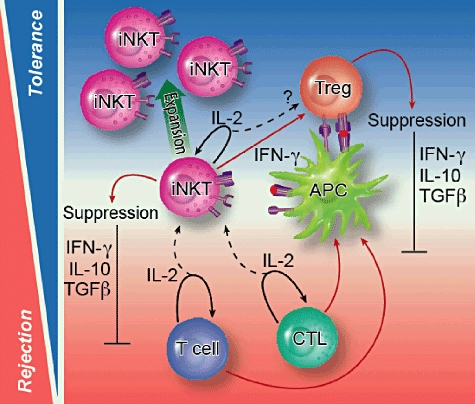Fig. 3.

Mechanisms by which invariant natural killer T (iNKT) cells are activated following transplantation; iNKT cells have been implicated in both the induction of transplantation tolerance and rejection, although the mode of activation remains largely unknown. We have recently described a novel mechanism of bystander iNKT cell activation following sequestration of interleukin (IL)-2 produced by activated conventional T cells (dotted black arrow). This pathway of activation is independent of CD1d–glycolipid/T cell receptor (TCR) interactions and is associated with the production of effector cytokine release [i.e. interferon (IFN)-γ]. We hypothesize that IL-2-mediated iNKT cell activation may be important in creating a microenvironment that promotes transplant tolerance, as regulatory T cells and iNKT cells may act synergistically to deplete IL-2 from the local microenvironment in addition to suppressing alloreactive T cell responses via the release of anti-inflammatory cytokines and/or interaction with APC bearing alloantigen. It is conceivable that such responses may be further enhanced through iNKT cell–APC interactions via cytokine production (i.e. IL-12) and co-stimulatory molecules (CD28, CD40L, OX40, GITR, ICOS, 41BB).
